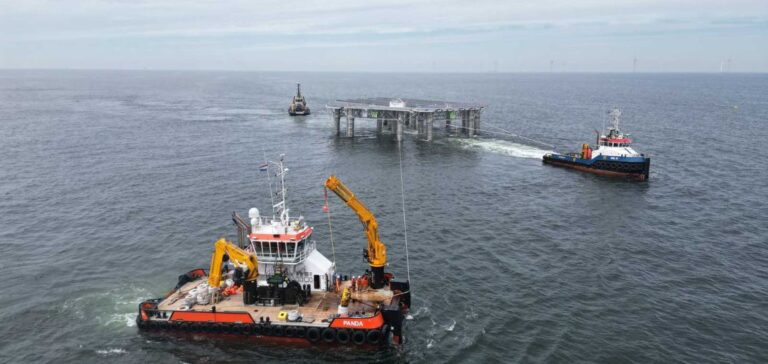SolarDuck, in collaboration with RWE, has successfully installed Merganser, a 0.5 megawatt peak (MWp) offshore floating solar pilot project. Located in the Dutch North Sea, around 12 kilometers off Scheveningen, this project aims to test and validate the structural, mooring and electrical designs required for the commercial deployment ofOFPV (offshore floating photovoltaic). The Merganser project comprises six interconnected platforms capable of withstanding extreme marine conditions. Connection to the mooring system was successfully achieved in a water depth of 20 meters. SolarDuck and RWE will continue to monitor the technical performance of this pilot project, focusing on structural durability and maintenance methods.
Technology and Methodology
The Merganser platform, designed to float several meters above the water, follows wave movements, keeping critical components dry and stable. This design was recently awarded the world’s first OFPV certification by Bureau Veritas. This pilot project will gather valuable data on structural loads and electrical performance from over 180 integrated sensors.
Collaboration and Objectives
The partnership between SolarDuck and RWE in this project combines SolarDuck’s technological expertise with RWE’s leading position in the offshore wind market. Over the next two years, Merganser’s performance will be closely monitored to assess its potential for large-scale commercialization. Sven Utermöhlen, CEO of RWE Offshore Wind, said the project could open up new opportunities for offshore renewable energy, particularly in regions with average wind speeds but high sun exposure. The results of this test phase will determine the next steps for eventual commercial deployment. Koen Burgers, CEO of SolarDuck, pointed out that this project is the fruit of collaboration with several partners, including TNO, TU Delft, MARIN, and Deltares, as well as supply chain players such as Damen Shipyards, TMA and Norsk Hydro. The aim of this collaboration is to optimize manufacturing and installation processes for the future. Ongoing monitoring of the project, notably by Deltares, will focus on structural and environmental impacts, providing crucial data for the future development of offshore floating solar power.






















